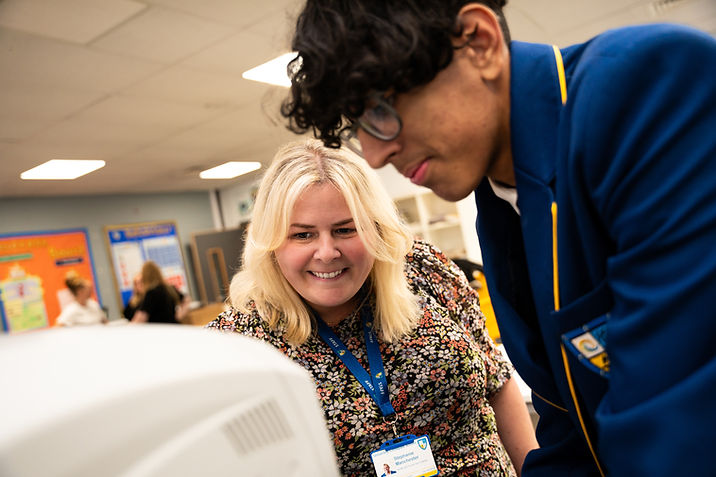
Modern Foreign Languages
Teaching French
Our Modern Foreign Language offer at The UCS is French, although native speakers of other languages are offered the chance to take an additional GCSE in their own language at the end of Y11. The curriculum area is growing, and will continue to do so as the school expands. French is currently offered to all students in KS3, and 5 students in Y10 have opted to study for a French GCSE. We did not offer French as a GCSE option in KS4 last year, or the year before, as the uptake was too small.
The KS3 and KS4 curriculum covers the National Curriculum, and we study for the AQA exam at GCSE. The content includes the three strands Vocabulary, Grammar and Phonics, which is taught, revisited and upscaled systematically across the five years. We follow the digital subscription Dynamo course in KS3 (Dynamo 1 in Y7, and Dynamo 2 in Y8), as it is a fun and engaging course which introduces students to, and gives ample practice at all the grammar, topics and Exam skills (Phonics, Listening, Speaking, Reading, Translation and Writing) needed for GCSE. The Dynamo course is a single digital textbook in Y7, which lends itself well to mixed-ability teaching, but offers differentiated textbooks (Rouge et Vert) in Y8 and beyond. We use the old Expo AQA course in KS4. This course is also differentiated (Rouge et Vert), but is a little outdated, as although it covers all the material for the new GCSE exam, it does not offer enough practice at the new exam skills, especially translation. Consequently, the course is supplemented by other activities either devised by the class teacher or else found online or in GCSE Revision Guides. Going forward, we intend to purchase the Dynamo 3 course for our Y9 students next year, but this is a new course, and is a work in progress, so has not yet been written beyond Dynamo 2. We also intend to update to the Dynamo GCSE course as soon as it becomes available.
In addition, the school has a subscription to Linguascope, which we use with all year groups, using the Beginner activities in KS3 and the Intermediate activities in KS4. We do not currently have any bespoke resources for Y9. Last year (2019-2020) was the first year we had a Y9 cohort, and MFL was taught as a “carousel” subject alongside History and Geography, with each subject being taught for two separate half terms. As only 2 students in that cohort had studied French before, and the rest were total beginners, we chose to use resources and materials we already had in school, rather than purchase bespoke Y9 materials for just one term. This year (2020-2021), Y9 students will be studying French for the whole year, but again, we have some students who have never studied French before, and as the Dynamo 3 course is still being written, the current Y9 course content is a combination of relevant materials from Dynamo 1+2, and Expo Vert.
We also offer an after-school Languages Club for Y7 students, which is run by our Trainee Teacher, and a KS4 visit to the Manchester Christmas Markets. We hope to offer more extra-curricular activities for Y8 and Y9 students in the future, such as visits to French cafés/restaurants, and visiting theatre groups, as well as French film clubs and residential trips to Paris for all students.

UTC Fingerprint
We promote Lifeskills in MFL, as theyare transferable skills, and are utilised in the workplace. The Lifeskills most relevant in MFL are Communication Skills (using and understanding the language), Problem solving (deciphering the language and using grammar correctly, especially where it is different from English, eg Word Order and Agreement of Adjectives) and Resilience (Learning a language is not easy, and tests the Resilience of our students), although we also promote Independence. The students are encouraged to work independently both in class and at home, and all have two Knowledge Organisers for each Module (one in their books and one on Showbie,which they can access at home), as well as access to dictionaries and a range of different reading materials in class. The weekly homework consists of learning vocabulary + another task (eg: Listening, Reading, Writing, Translating etc).
Digital Learning is very much a part of our curriculum, as our Y7 & Y8 course materials are all online, and we intend to purchase the same course (Dynamo) for Y9 next September, once it has been written. We use Showbie regularly in class and for homework, and students also have independent access to different websites (eg: Linguascope, Languagesonline, GCSE pod), which they can access both in school and at home on iPads, mobiles or home PCs.
Over the five years in MFL, students are offered a number of opportunities which bring the curriculum to life, some of which also offer opportunities for employer engagement. These include French breakfasts, visiting a French café, ta theatre experience with a play in French, and residential trips to Paris, and in the future we hope to arrange a visit to Egin, a French company based in Salford.
Pedagogy
Pedagogy in MFL allows the needs of all students to be met. Differentiation takes place in several ways, eg: gap-filled worksheets, simpler activities, basic vocabulary/phrases and model answers for the Lower Ability students; separate textbooks, higher level vocabulary/phrases and extension tasks for the Higher Ability students. Challenge is the starting part in the development of all lessons, working backwards to plan the steps that will allow all students the potential to complete the challenge.
Following the whole school teaching and learning objectives, lessons are structured using the 5 P’s with a clear Do Now task on entry to motivate the students as soon as they enter the room.
Challenge in a lesson may link to a specific examination skill that draws on a specific piece of knowledge. Through the use of short repetitive learning methods, students are able to process and store more information.






